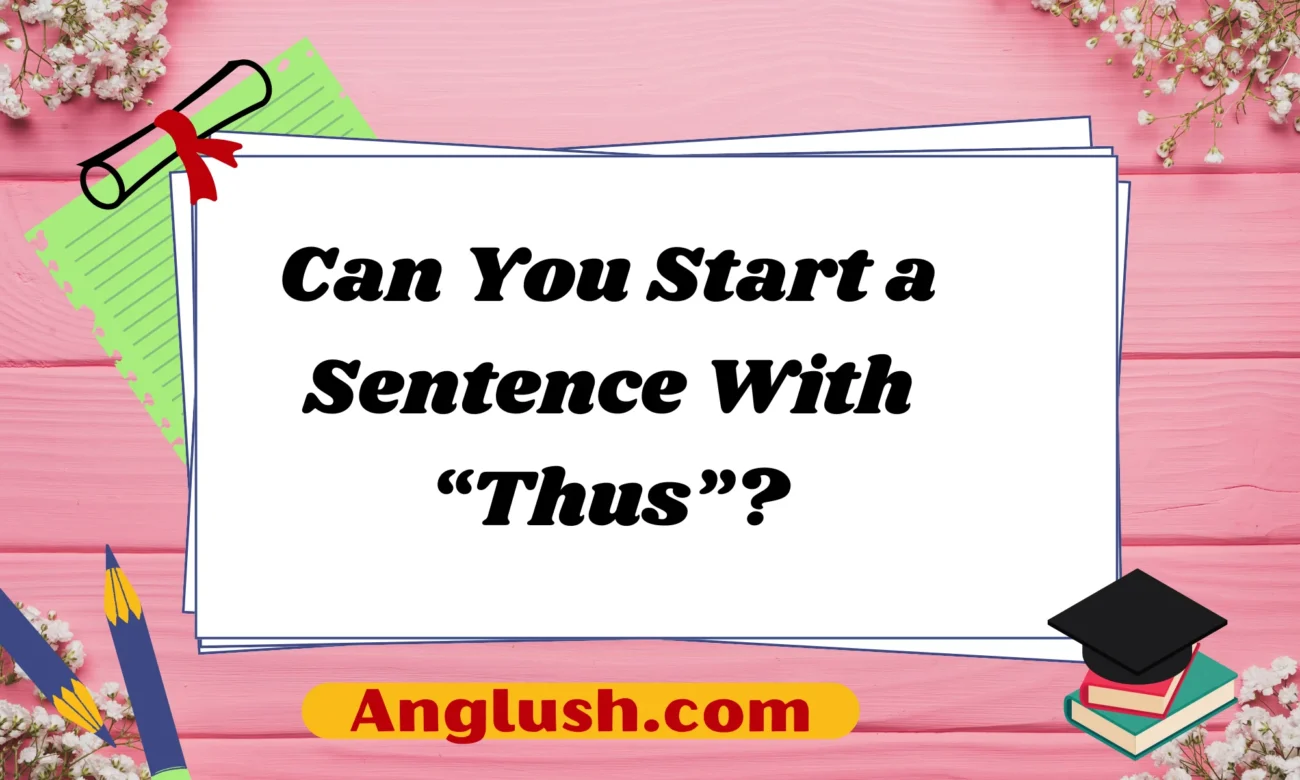Introduction
The English language has many transitional words that help connect ideas smoothly. One such word is “thus.” But can you start a sentence with “thus”? The simple answer is yes—but it depends on the context and tone.
Using “thus” at the beginning of a sentence is common in formal writing, academic papers, and professional reports. However, in casual conversations or informal writing, it may sound too stiff or overly formal. This article will explore when and how to use “thus” correctly, offer various polite, professional, and casual alternatives, and provide 11 texting examples that make communication smooth and natural.
Understanding “Thus” in Sentence Structure
The word “thus” functions as an adverb, meaning “as a result,” “therefore,” or “in this way.” It helps indicate cause-and-effect relationships in writing.
Examples of “Thus” in Sentences:
- Formal Usage:
- “The experiment failed. Thus, a new approach is required.”
- “She studied hard. Thus, she passed the exam with flying colors.”
- Professional Usage:
- “Our revenue has increased by 20% this quarter. Thus, we plan to expand our operations.”
- “The company’s new marketing strategy was highly effective. Thus, customer engagement improved significantly.”
- Academic or Research Writing:
- “The data suggests a correlation between diet and productivity. Thus, further research is needed.”
- “The hypothesis was not supported by the results. Thus, alternative explanations must be considered.”
While “thus” works well in these contexts, it may sound too formal or unnatural in casual conversations. Instead, we can use different words or phrases depending on the tone and setting.
Polite, Professional, and Casual Alternatives to “Thus”
If you want to start a sentence with a transition but avoid sounding too formal, consider these alternatives:
1. Formal & Professional Alternatives
These options work well in professional emails, reports, and academic writing.
| Alternative | Example |
| Therefore | “The results were inconclusive. Therefore, more tests will be conducted.” |
| As a result | “The company invested in better technology. As a result, efficiency improved.” |
| Consequently | “The team worked overtime. Consequently, the project was completed ahead of schedule.” |
| Hence | “The weather was unpredictable. Hence, the event was postponed.” |
| Accordingly | “The law has changed. Accordingly, all contracts must be updated.” |
2. Polite & Neutral Alternatives
These options are softer and work well in both professional and everyday conversations.
| Alternative | Example |
| That’s why | “She practiced every day. That’s why she won the competition.” |
| For this reason | “He was feeling unwell. For this reason, he left work early.” |
| Because of this | “The traffic was heavy. Because of this, we arrived late.” |
3. Casual & Conversational Alternatives
These alternatives sound more natural in daily conversations, informal writing, and texts.
| Alternative | Example |
| So | “It was raining. So, we decided to stay inside.” |
| That means | “You missed the deadline. That means you’ll have to submit it next week.” |
| Then | “I forgot my keys. Then, I had to wait outside for an hour!” |
How to Choose the Best Alternative
When selecting an alternative to “thus,” consider the following:
- Tone of Communication
- Formal: Use “therefore,” “consequently,” or “as a result.”
- Neutral: Use “for this reason” or “because of this.”
- Casual: Use “so” or “that means.”
- Context
- Professional emails: “Accordingly, the proposal will be revised.”
- Everyday conversation: “It’s snowing. So, I’m staying home.”
- Audience
- Talking to a boss or professor? Stick to formal options.
- Texting a friend? Go with casual choices like “so” or “then.”
11 Texting Examples Using Alternatives to “Thus”
Texting tends to be informal, so the following examples use natural, user-friendly alternatives to “thus”:
- “I forgot my umbrella. So, I got soaked!”
- “It’s freezing outside. That means we should wear extra layers.”
- “I overslept. That’s why I was late for work.”
- “He didn’t reply. Because of this, I called instead.”
- “She loves coffee. As a result, she drinks three cups a day.”
- “The WiFi is down. Therefore, I can’t join the meeting right now.”
- “He lost his keys. Consequently, he was locked out for hours.”
- “It started raining. Then, we had to cancel the picnic.”
- “The new phone is too expensive. Hence, I’ll wait for a discount.”
- “He didn’t study. For this reason, he failed the test.”
- “She’s allergic to nuts. Accordingly, she avoids peanut butter.”
These examples show how different words can make communication sound more natural and effective depending on the situation.
Final Thoughts
Yes, you can start a sentence with “thus,” especially in formal and professional writing. However, in casual conversations, it may sound overly formal or unnatural. Choosing the right alternative—such as “so,” “therefore,” or “that’s why”—ensures clear and effective communication.
When deciding which word to use, consider the tone, context, and audience. If you’re writing a formal report, “thus” or “consequently” might be best. For everyday conversation or texting, “so” or “that means” will sound more natural.
By understanding these nuances, you can improve both written and spoken communication, making your messages clearer and more engaging!

